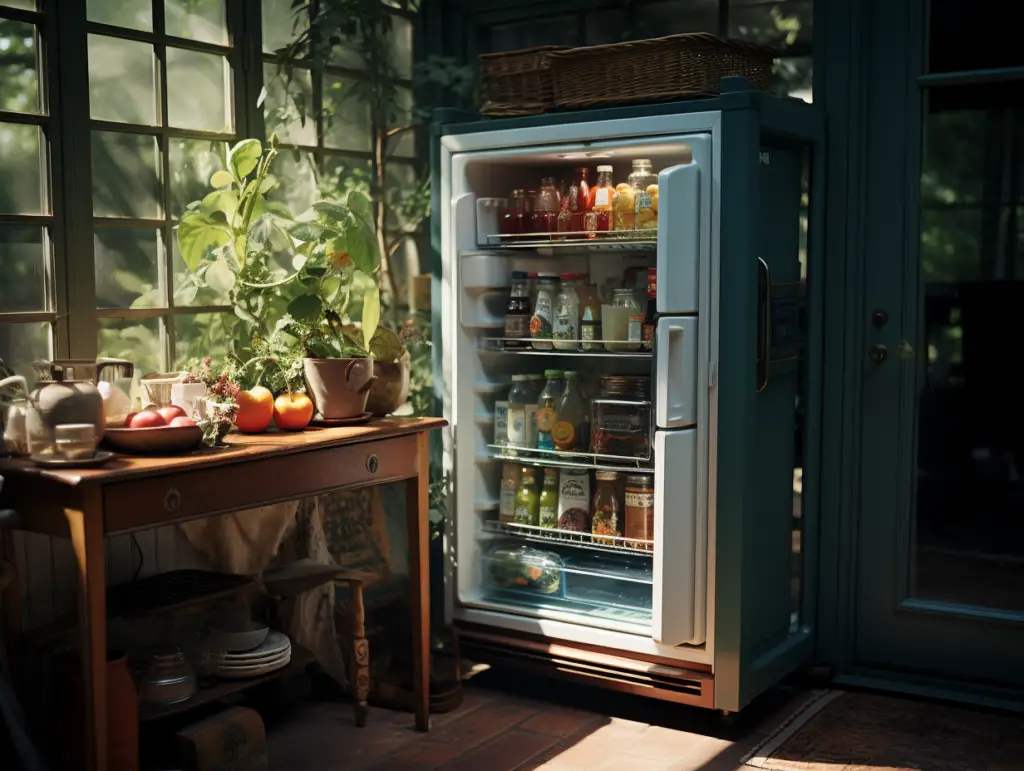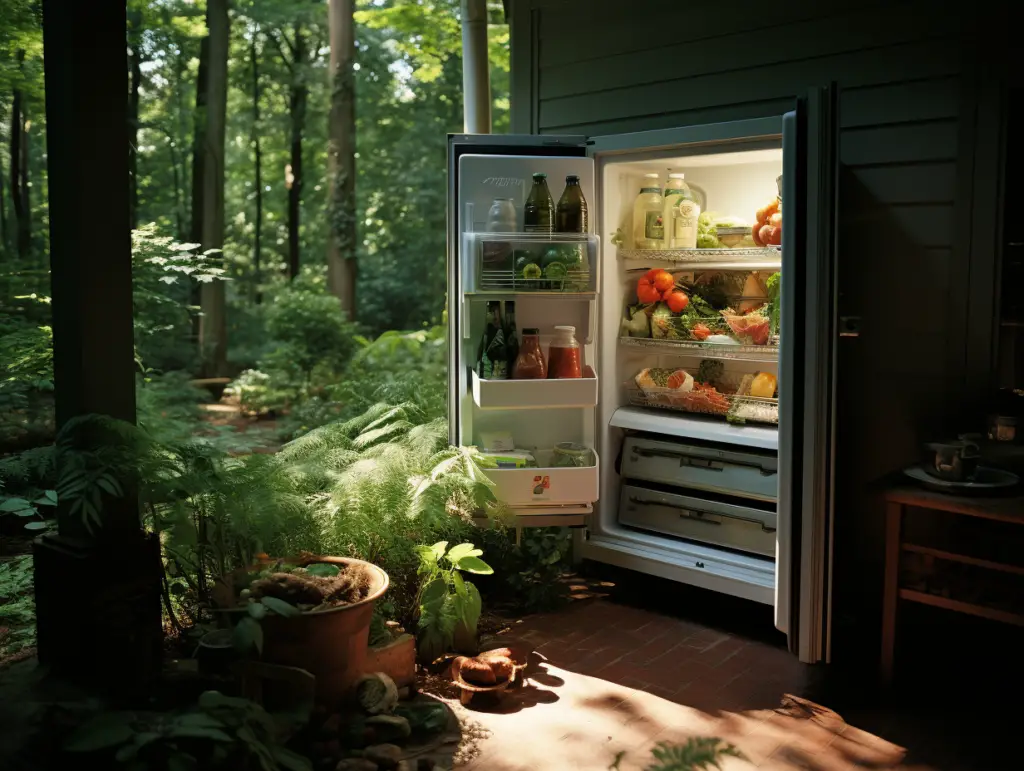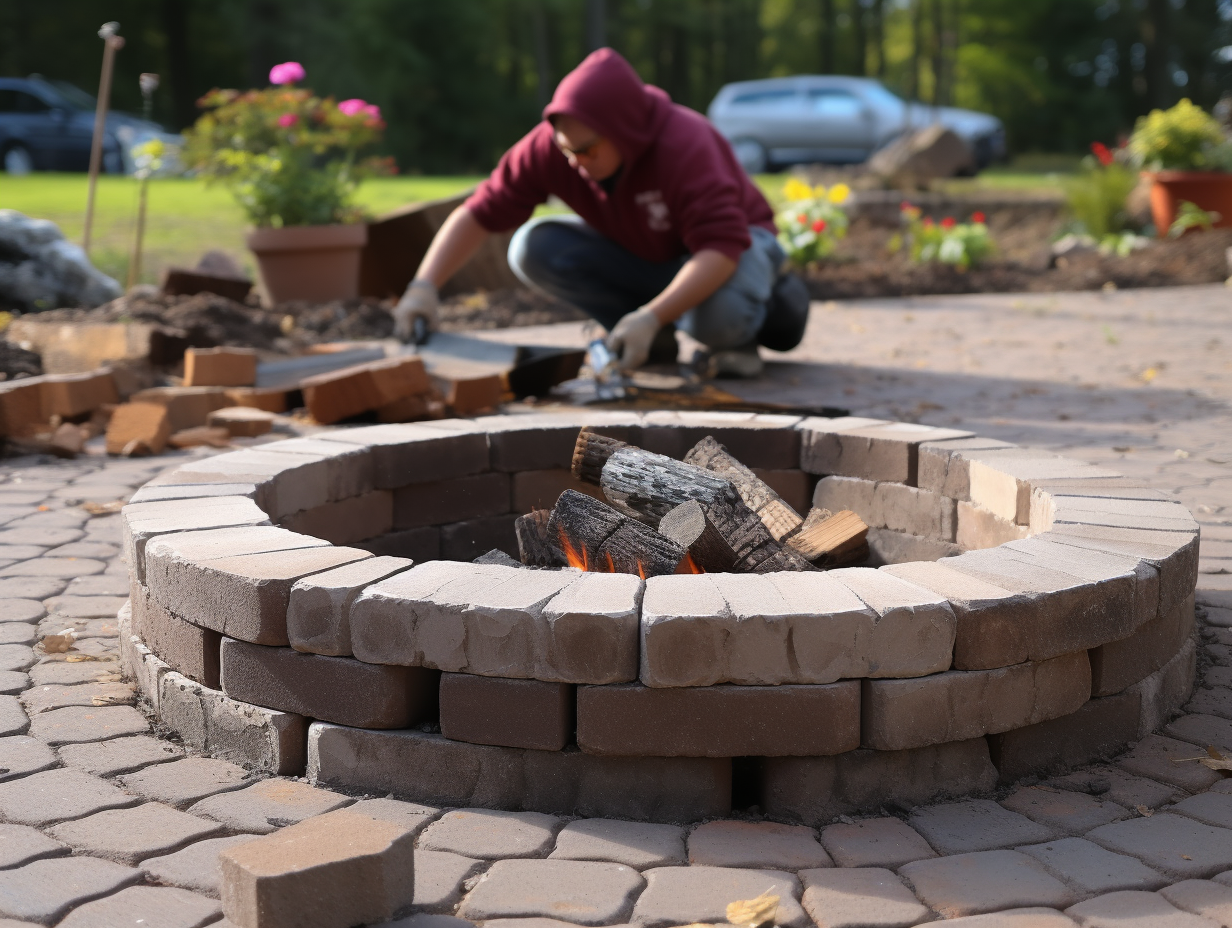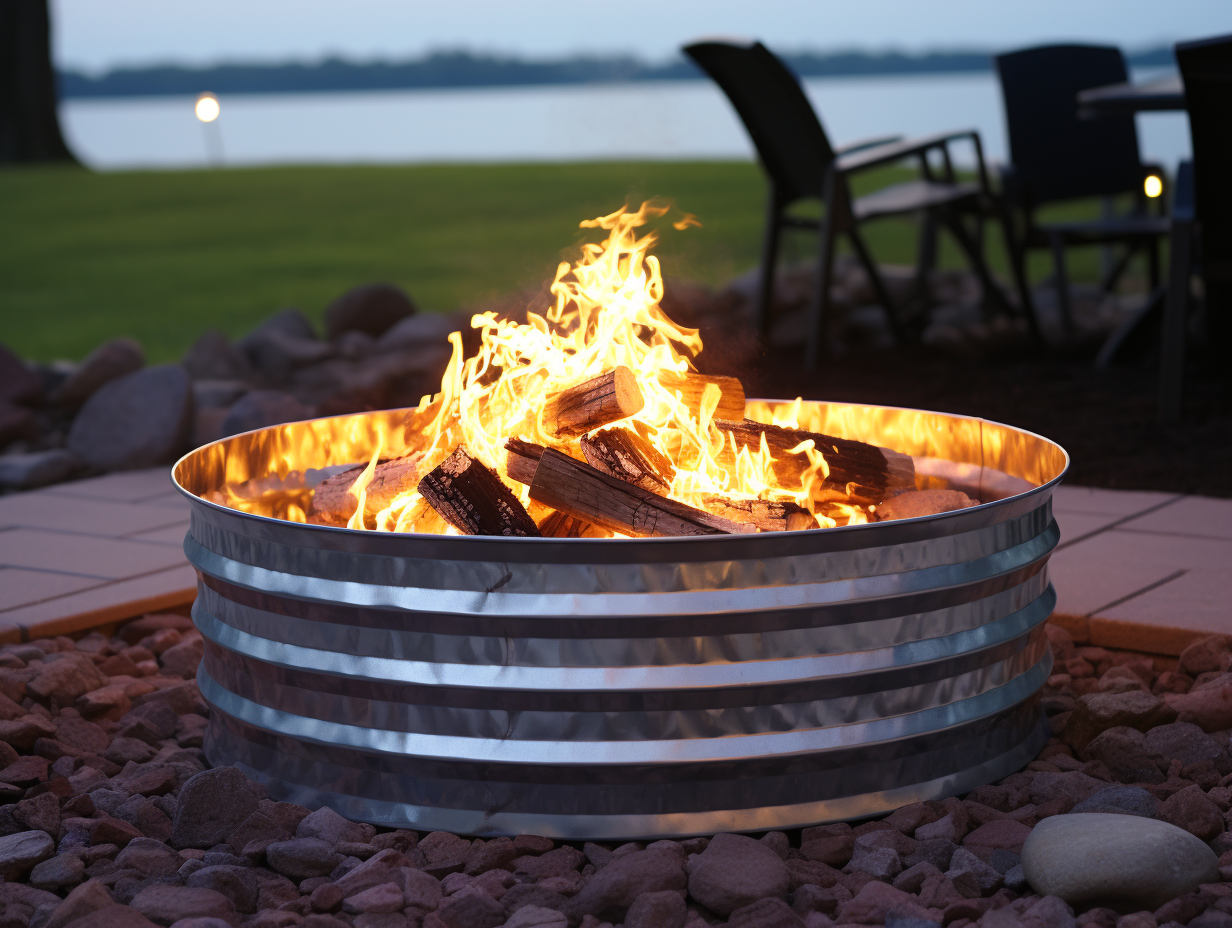Refrigerators are an essential appliance in modern households. They keep our food fresh and prevent spoilage. But what if you want to put a refrigerator outside? Can you do that? The answer is not straightforward. While it is possible to put a refrigerator outside, there are certain precautions you need to take.
When you put a refrigerator outside, you expose it to different environmental conditions that can impact its performance. Factors such as temperature, humidity, and exposure to sunlight can all affect the refrigerator’s ability to cool properly.
If you’re considering putting a refrigerator outside, it’s essential to understand the potential problems that may arise. Indoor refrigerators are not designed to withstand the elements and may not work correctly outside.
However, outdoor refrigerators are built to withstand harsh weather conditions and are rust-proof. Additionally, outdoor refrigerators come with safety features that prevent electrical hazards.

Key Takeaways
- While it is possible to put a refrigerator outside, indoor refrigerators are not designed to withstand harsh weather conditions.
- Outdoor refrigerators are built to withstand the elements and come with safety features that prevent electrical hazards.
- When choosing a refrigerator for outside use, it’s important to consider factors such as temperature, humidity, and exposure to sunlight.
Understanding Refrigerators and Their Components
Refrigerators are essential appliances that help keep our food and drinks fresh and cool. They are complex machines that have several components working together to provide the desired results.
In this section, we will discuss the main components of refrigerators and their differences between indoor and outdoor models.
Indoor Refrigerators
Indoor refrigerators are designed to work in controlled environments, such as homes, apartments, and offices. They are not intended to be used outside, as they are not built to withstand the elements. Indoor refrigerators have the following main components:
- Compressor: This component is responsible for compressing the refrigerant gas and circulating it through the system.
- Condenser: The condenser is responsible for releasing the heat from the compressed refrigerant gas.
- Evaporator: The evaporator is responsible for absorbing the heat from the refrigerator’s interior and cooling the air inside.
- Gaskets/seals: These components are responsible for keeping the cold air inside the refrigerator and preventing warm air from entering.
Outdoor Refrigerators

Outdoor refrigerators are specifically designed to be used outside, such as on patios, decks, or outdoor kitchens. They have several features that make them suitable for outdoor use, such as:
- Rust-resistant materials: Outdoor refrigerators are made of materials that can withstand exposure to the elements, such as rain, sun, and wind.
- Weatherproof gaskets/seals: These components are designed to keep the cold air inside the refrigerator and prevent warm air from entering, even in extreme weather conditions.
- Built-in heaters: Outdoor refrigerators have built-in heaters that prevent them from freezing in cold weather.
In addition to the components found in indoor refrigerators, outdoor refrigerators may also have additional features, such as:
- Built-in ice makers: Some outdoor refrigerators come with built-in ice makers, eliminating the need for a separate ice machine.
- LED lighting: Outdoor refrigerators may have LED lighting that illuminates the interior, making it easier to find what you need.
In conclusion, refrigerators are complex machines that have several components working together to provide the desired results. Indoor refrigerators are designed to work in controlled environments, while outdoor refrigerators are specifically designed to be used outside and can withstand exposure to the elements. Understanding the differences between these two types of refrigerators can help you make an informed decision when choosing the right appliance for your needs.
Impact of Outdoor Conditions on Refrigerators

When it comes to placing a refrigerator outside, it’s important to consider the impact of outdoor conditions on the appliance. In this section, we’ll discuss the effect of temperature, sunlight, rain, and humidity on refrigerators.
Effect of Temperature
The ambient temperature outside can have a significant impact on the performance of a refrigerator. Most refrigerators are designed to operate within a specific temperature range, typically between 55 and 80 degrees Fahrenheit. If the outdoor temperature falls outside of this range, the refrigerator may not work as efficiently, which can result in higher energy consumption and potentially even damage to the appliance.
In hot weather, the refrigerator may have to work harder to maintain the desired temperature inside. Conversely, in freezing temperatures, the refrigerator may struggle to keep food from freezing. For this reason, it’s important to choose an outdoor refrigerator that is designed to operate in the temperature range of your local climate.
Effect of Sunlight
Direct sunlight can also have a significant impact on the performance of a refrigerator. If the refrigerator is exposed to direct sunlight for extended periods, it may have to work harder to maintain the desired temperature inside. This can lead to higher energy consumption and potentially even damage to the appliance.
To minimize the impact of sunlight, it’s important to place the refrigerator in a shaded area. If this is not possible, consider using a cover or canopy to protect the refrigerator from direct sunlight.
Effect of Rain and Humidity
Rain and humidity can also impact the performance of a refrigerator. If the refrigerator is exposed to rain, it may be at risk of water damage. Similarly, if the humidity is high, the refrigerator may have to work harder to remove moisture from the air inside. This can lead to higher energy consumption and potentially even damage to the appliance.
To minimize the impact of rain and humidity, it’s important to choose an outdoor refrigerator that is designed to be weather-resistant. Additionally, consider placing the refrigerator in a covered area or using a cover or canopy to protect it from the elements.
Overall, it’s important to consider the impact of outdoor conditions on a refrigerator when placing it outside. By choosing a refrigerator that is designed to operate in the temperature range of your local climate and protecting it from direct sunlight, rain, and humidity, you can help ensure that it operates efficiently and lasts for years to come.
Potential Problems with Using a Refrigerator Outside
When considering using a refrigerator outside, there are a few potential problems you should be aware of. These include damage to components, strain on electrical load, and increased energy costs.
Damage to Components
One of the main concerns with using a refrigerator outside is the potential for damage to its components. Exposure to the elements, such as rain, snow, and direct sunlight, can cause damage to the fridge’s compressor, condenser coils, and other parts. This can lead to malfunctions, reduced efficiency, and ultimately, costly repairs or replacement.
Strain on Electrical Load
Another issue to consider is the strain on your electrical load. Outdoor refrigerators require a significant amount of power to run, and if you have other outdoor appliances running at the same time, it can put a strain on your electrical system. This can lead to tripped breakers, electrical fires, or other safety hazards.
Increased Energy Costs
Using a refrigerator outside can also lead to increased energy costs. Outdoor refrigerators are designed to work in a wide range of temperatures, which means they require more energy to maintain the desired temperature in extreme heat or cold. This can lead to higher electricity bills, especially if you use your outdoor refrigerator frequently.
In summary, using a refrigerator outside can come with some potential problems, including damage to components, strain on electrical load, and increased energy costs. It’s important to consider these factors before investing in an outdoor refrigerator and take steps to mitigate any potential issues.
Choosing the Right Type of Refrigerator for Outside Use

When it comes to choosing a refrigerator for outdoor use, there are a few things to consider to ensure you get the right one for your needs. Here are some factors to keep in mind when selecting a refrigerator for outside use.
Considerations for Indoor Refrigerators
While it may be tempting to use your indoor refrigerator outside, it’s important to note that not all refrigerators are designed for outdoor use. Indoor refrigerators are not built to withstand the elements and can rust or deteriorate quickly when exposed to moisture and temperature fluctuations.
Benefits of Outdoor Refrigerators
Outdoor refrigerators are specifically designed to withstand the elements and maintain their performance in harsh conditions. They are typically made with durable materials such as rust-resistant or rust-proof 304-grade stainless steel. Additionally, outdoor refrigerators are UL certified, meaning they have been tested and approved for outdoor use.
When choosing an outdoor refrigerator, it’s important to consider the specific features that will best suit your needs. For example, some outdoor refrigerators come with built-in ice makers or beverage dispensers, while others have multiple temperature zones for storing different types of food and drinks.
In summary, when choosing a refrigerator for outdoor use, it’s important to select a durable material that can withstand the elements and maintain its performance over time. Outdoor refrigerators are specifically designed for this purpose and are UL certified to ensure their safety and reliability.
Tips for Using a Refrigerator Outside
When it comes to using a refrigerator outside, there are some important tips to keep in mind to ensure that your appliance functions properly and lasts as long as possible. Here are some key considerations for using a refrigerator outdoors:
Placement and Shielding
One of the most important factors to consider when using a refrigerator outside is where you place it. You’ll want to choose a location that is protected from the elements, including wind, sun, and rain. This can help prevent damage to the hardware and coils of the refrigerator, which can impact its performance and lifespan.
To shield your refrigerator from the elements, consider using a cover or enclosure that is specifically designed for outdoor use. This can help protect the appliance from moisture, dust, and other debris that can cause damage over time.
Maintenance and Cleaning
Another important aspect of using a refrigerator outside is regular maintenance and cleaning. It’s important to inspect and clean the appliance on a regular basis to ensure that it is functioning properly and to prevent any potential safety hazards.
To keep your outdoor refrigerator in good condition, make sure to clean the coils and other components regularly. This can help prevent dust and debris from building up, which can reduce the efficiency of the appliance over time.
Safety Precautions
Finally, it’s important to take appropriate safety precautions when using a refrigerator outside. This includes making sure that the appliance is properly grounded and that all electrical connections are secure.
It’s also important to follow any manufacturer guidelines related to outdoor use of the appliance. For example, some outdoor refrigerators may require additional ventilation or other safety features to ensure proper operation.
By following these tips and taking appropriate precautions, you can enjoy the convenience of using a refrigerator outside while ensuring that your appliance functions properly and lasts as long as possible.
Alternatives to Using a Traditional Refrigerator Outside
If you’re looking to have a refrigerator outside, but don’t want to risk damaging your indoor refrigerator or investing in an outdoor-specific model, there are a few alternatives to consider.
Mini Fridge
A mini fridge is a great option for those who only need to store a few items outside. These compact refrigerators are designed to be portable and can easily fit in small spaces. They typically have a capacity of around 1.7 to 4.5 cubic feet, making them perfect for storing drinks, snacks, and condiments. Plus, they’re energy-efficient and cost-effective.
When choosing a mini fridge for outdoor use, look for models that are designed to withstand the elements. Some models come with weather-resistant coatings or are made from materials that are resistant to rust and corrosion. Additionally, make sure to keep the fridge in a shaded area to avoid direct sunlight, which can cause the fridge to work harder and decrease its lifespan.
Garage Refrigerators
Another option to consider is using a garage refrigerator. Many households have a second refrigerator in their garage, which can be used to store food and drinks for outdoor parties and events. Garage refrigerators are designed to operate in a wide range of temperatures, making them ideal for outdoor use.
When using a garage refrigerator outside, make sure to keep it in a covered area to protect it from rain and direct sunlight. Additionally, keep the fridge clean and well-maintained to prevent mold and bacteria growth.
Overall, both mini fridges and garage refrigerators are great alternatives to using a traditional refrigerator outside. They’re cost-effective, energy-efficient, and can withstand the elements when used properly. So, if you’re looking for a way to keep your food and drinks cold outside, consider one of these options instead of risking damage to your indoor refrigerator.
Conclusion
In conclusion, it is possible to store a refrigerator outside, but it comes with its own set of pros and cons. It is a convenient option for large families, those who like to purchase in bulk, or anyone who might benefit from the convenience of having food and beverages nearby while they enjoy the great outdoors. However, leaving a refrigerator outside in the summer or winter can impact its performance and lifespan.
Investing in an outdoor refrigerator is a great option for those who plan to stay in one place for a longer period of time. It provides flexibility and convenience, especially for outdoor kitchens or patios. However, if it is just a temporary solution or if the length of stay is short, it may not be worth the investment.
One of the biggest concerns with leaving a refrigerator outside is the electrical connection. It is important to ensure that the refrigerator is properly grounded and protected from the outdoor elements. Cooler weather conditions may also impact the performance of the refrigerator, so it is important to consider the outdoor conditions before making a decision.
Overall, it is legal to leave a refrigerator outside, but it is important to check with local regulations and guidelines. It is also important to properly store a refrigerator outside to ensure its longevity and performance. With proper care and maintenance, leaving a refrigerator outside can be a convenient and practical option for many homeowners.
Frequently Asked Questions
Can a refrigerator be used outdoors?
Yes, a refrigerator labeled for outdoor use can be used outside if the proper safety precautions are established. Outdoor refrigerators have safeguards in place that protect against problems commonly found with indoor fridges. However, it is not recommended to use an indoor refrigerator outside as it is not designed to withstand the elements.
What are the best outdoor refrigerators?
The best outdoor refrigerators are those specifically designed for outdoor use. They are built to withstand extreme temperatures, humidity, and other outdoor elements. Look for models with durable construction, weather-resistant finishes, and sealed electrical components.
How do you protect an outdoor refrigerator from the elements?
To protect an outdoor refrigerator from the elements, it is important to keep it covered when not in use. A weather-resistant cover or enclosure can help protect it from rain, snow, and other outdoor elements. Additionally, it is important to keep the area around the refrigerator clean and free of debris to prevent damage.
What is the difference between indoor and outdoor refrigerators?
The main difference between indoor and outdoor refrigerators is their construction and design. Outdoor refrigerators are built to withstand extreme temperatures, humidity, and other outdoor elements. They are also designed to be more energy-efficient and have sealed electrical components to prevent damage from moisture.
What should I consider before buying an outdoor refrigerator?
Before buying an outdoor refrigerator, consider the size and capacity you need, the climate in your area, and the features you want. Look for models with durable construction, weather-resistant finishes, and sealed electrical components. Additionally, consider the cost of operation and maintenance.
Can an indoor mini fridge be used outside safely?
No, an indoor mini fridge should not be used outside as it is not designed to withstand the elements. Using an indoor fridge outside can lead to damage to the unit and potentially dangerous situations. It is important to use a refrigerator specifically designed for outdoor use.





Leave a Reply